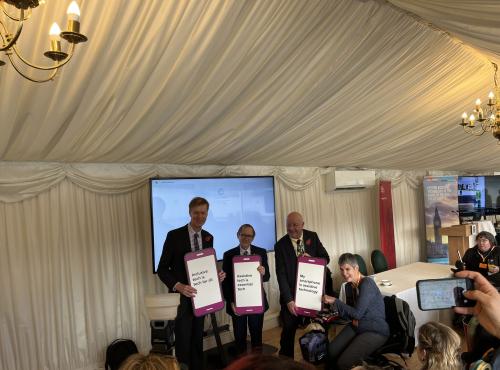Using Data and Technology For Good – How parties can harness the benefits of big data during GE19
During the next six weeks a spotlight light will be shone on how the political parties use data to promote their ideas and criticise their opponents - in this blog, CEO Jonathan Shaw discusses how the next Government can build public trust so our personal data is only used for good.
Data is dispassionate. There is no such thing as “good” or “bad” data – only how it is used. The controversy over Cambridge Analytica, as recently showcased in Netflix’s documentary The Great Hack, highlights how dark influences can undermine democratic accountability and the rule of law.
However I firmly believe that public institutions can strengthen the relationship between big data and society and work towards using data exclusively for good. In May, Policy Connect launched Trust, Transparency and Tech, a landmark report for the All-Party Parliamentary Group on Data Analytics.
The report sets out an action plan for the ethical use of data that protects the public whilst promoting innovative solutions to public policy challenges. Healthcare, education, policing and transport are just some of the areas where big data is revolutionising society for the better. However, to truly embrace the potential of the so-called “Fourth Industrial Revolution”, those providing public services have to do much more to ensure that members of the public trust that their data is being used for the betterment of all.
Our core recommendations were based around three key areas.
Firstly, to ensure that both public and private sector delivering public services lead by example, ensuring that the bodies that make use of our data – such as the NHS, police and partner providers in the private sector – abide by the highest ethical standards. To achieve this we need to implement a data ethics ‘licence to operate’ for public services.
The public must be put at the heart of service design, building in their views, and ensuring that the citizen has meaningful access to data held about them and about the nature of algorithms used to take decisions about them.
The second covers the role of the Centre for Data Ethics and Innovation (CDEI), set up by Theresa May’s Government to “connect policymakers, industry, civil society, and the public to develop the right governance regime for data-driven technologies.” It is vital that the potential the Centre has is not wasted and all political parties should prioritise legislation to place the CDEI on a statutory footing so that it can make the UK a world leader in ethical technology policy.
Finally – we have called for more effective ways for parliament to engage with the data-driven world. Parliament has, through the decades, provided scrutiny and promoted new approaches to the big societal challenges of the time such as setting up The Public Accounts and the Environment Audit– it needs to do the same for the data-driven world through a new, cross-cutting, dedicated Select Committee for Data.
High ethical standards can drive public confidence and the UK is uniquely placed to be a world leader in ethical data-based policies. Over a third of Europe’s technology ‘unicorns’ – start-ups valued at $1 billion – are based in Britain. We are also home to the world’s largest legal sector, as well as a highly adaptive workforce. If policy makers take the right decisions, we can become an example of best practice for the use of big-data, avoiding the mistakes of Facebook and Google in Silicon Valley, whilst still fostering a culture of innovation and radicalism.
I continue to be optimistic for the revolutionary potential that data-based technologies can have for wider society and the individual. Even in these early stages, we can see the possibilities that they offer. From autonomous vehicles offering those with disabilities more freedom, to new medical techniques being developed at our hospitals, we can aspire to a society in which we all share in the collective benefits that the ethical use of big data presents.



